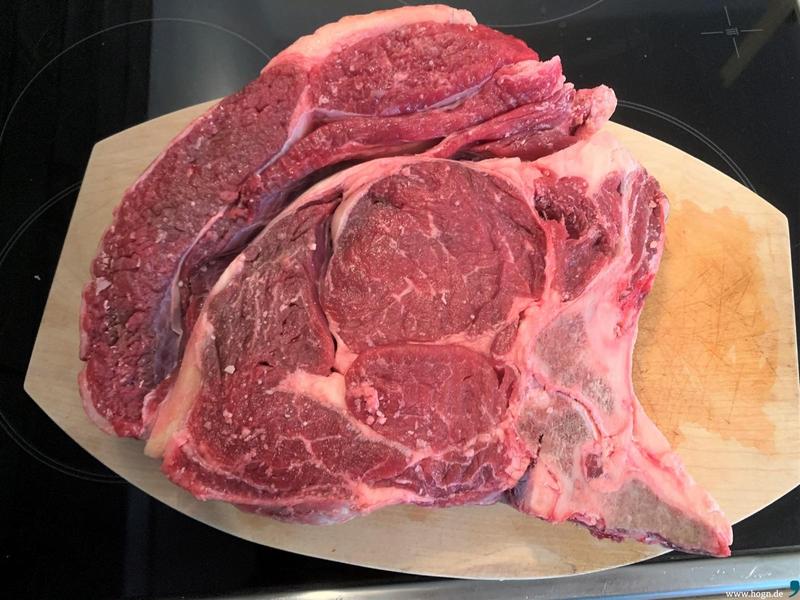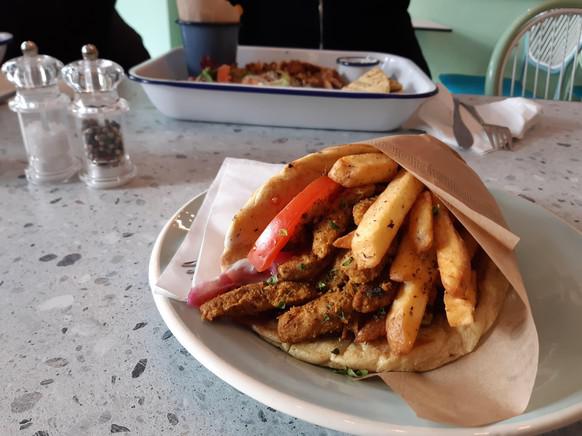
away. “Organic farms can only have a future with direct marketing,” farmer Andreas Hödl is certain. He was taught that over and over again during his training. That's why he wants to market as many of his products as possible himself. He has already started with so-called cow-sharing, in other words: you can reserve the meat from your bulls for your own use via the organic farm's website. Slaughtering only takes place when there are enough buyers. But this is just the beginning. A farm shop with a large selection of products is to follow in autumn.
Young farmer with vision: In the long term, Andreas Hödl would like to market at least eighty percent of the goods that his organic farm produces directly.
85 dairy cows are on the pasture around the organic farm in the Froschau near Wegscheid. "I didn't want to expand again and keep more cows," says the 23-year-old organic farmer. Dairy cows are particularly profitable if you have a lot: Because with each additional animal there are more subsidies. Selling the milk to a large dairy is then particularly worthwhile: "You need more and more cows, there's no end to it," regrets the farmer.
Fine steaks from organic bulls
What also bothers him: "There is no longer an upper limit as to what a dairy cow should be able to achieve." Andreas Hödl would like to implement the organic idea as much as possible on his farm, for example would like to feed less concentrated feed. That is why he is now implementing what he learned during his training at the organic school in Schlägl, Austria: direct marketing.
As soon as ninety percent of the meat has been sold, Hödl has one of his bulls slaughtered.
The milk is the second step. The young farmer made the first move towards selling from the farm five years ago: he regularly has a bull slaughtered and sells the meat directly to his customers instead of to a butcher. "It started in 2016 with a WhatsApp group," Hödl recalls. He reached his customers via the messenger service, and the number gradually increased.
The fact that he is now raising meat sales, regularly slaughtering a bull every four weeks and also offering cow-sharing via his website and social media channels happened more or less by accident: “A few years ago I bought several cows in Hanover bought,” says Andreas Hödl. Because a cow there is around 600 euros cheaper than in Germany. With several dozen animals, it is therefore profitable to buy them so far away. "And the seller's son-in-law creates a website that can be used to offer direct marketing," reports Hödl. This gave rise to the idea of creating such an offer for our own farm.
A steak from organic bulls can sometimes weigh over a kilo.
He has already twice sold a bull via cow-sharing. For the first time, customers could reserve a mixed package in advance, which included filet, loin and ground beef. Once there were enough reservations, the animal was slaughtered and the customers received their meat. The second time, he and the butcher came up with the idea of also offering finer steaks from bulls: Tomahawk, T-bone, Kluft steaks, beef fillets. "Everyone gets cricket sick as soon as the weather gets better," says the farmer and laughs.

Learning by doing: When does the meat taste ideal?
What sounds simple was initially a complicated undertaking: Hödl had to roughly estimate how many steaks he could produce from a bull. “But everyone is different”, as he knows. Together with the butcher, he estimated the animal's carcass weight and the quantities of steaks he could offer the customers. In the end, one or the other got one more filet - and one porterhouse steak less. "But for the first time it worked surprisingly well," sums up the 23-year-old. Only twenty kilos of meat remained.
Cozy togetherness: the bulls spend several weeks of their lives together with the cows.
You can order the meat on the organic farm's website - whenever a bull is ready for slaughter. Andreas Hödl then informs his regular customers via newsletter. As soon as ninety percent of the beef is sold, it is slaughtered. Depending on the type of steak, the customer has to pay up to 45 euros per kilo of organic cattle. It's worth it for many customers. After all, they know exactly where their meat comes from.
"Pasture husbandry, straw fattening, etc. - that all costs money," says Andreas Hödl. He has to fatten a bull for at least two years before he can slaughter it. The meat sold should also meet the highest standards. The young farmer experimented a lot to keep improving the quality. "It's learning by doing," he explains. "The last four weeks before slaughter, for example, the bulls are given concentrated feed, which improves the quality." But he doesn't have to fatten the animals all their lives to get good meat. One reason for this is that his bulls are allowed to run with the cows for several weeks.
Increase direct marketing instead of livestock
Andreas Hödl is the third generation to run the family business. “My grandfather built the farm here in the 1980s,” he reports. Before that, the grandfather had a small farm in the neighboring village of Kasberg with only eight cows. After building a larger barn in the Froschau, he gradually increased his livestock to around 30 animals.
Both the dairy cows and the organic farmer's bulls spend the summer on the pasture. Photo: Hödl
After his grandfather, Andreas Hödl's father took over the farm. When he in turn asked his son if he wanted to follow in his footsteps, Andreas replied: "Yes, if we expand the business." This happened in the years 2012 to 2014: They expanded the barn, mostly doing the work themselves. "The offer from the construction companies was simply too expensive," Andreas Hödl looks back with a smile.
It was not only important to the young farmer to have a larger number of livestock, but also to be able to work as organically and naturally as possible. The farm has been certified organic since the turn of the millennium. "Two years ago I still had 97 cows," says Hödl. "Since we've downsized again, I can really live the organic idea."
For him it has always been a matter of course that a bull walks with the cows on the pasture. "We don't do artificial insemination." This is one of the reasons why he owns 25 bulls in addition to the dairy cows. He uses the money he earns with their meat as a “nest egg” – for larger purchases if something breaks on the tractor. And for setting up direct marketing.
Farm shop planned with a wide range of products
Because his ideas don't end with cow-sharing. "We want to open our farm shop in autumn," says the organic farmer. With the milk from his cows, of course, with sausage and cheese that he wants to have made by a cheese dairy. "Soon there will also be 150 chickens living here," Hödl looks ahead. Eggs are then also included in the offer of the farm shop.
You should also be able to pre-order the bull meat directly in the farm shop on a tablet. "They also have the potatoes that we grow there." Andreas Hödl wants to offer other types of vegetables in cooperation with a neighboring farm. Just like honey. “My goal is to eventually market about eighty percent of what I produce on the farm directly. And then to live the organic idea all around.”
Sabina Simon







